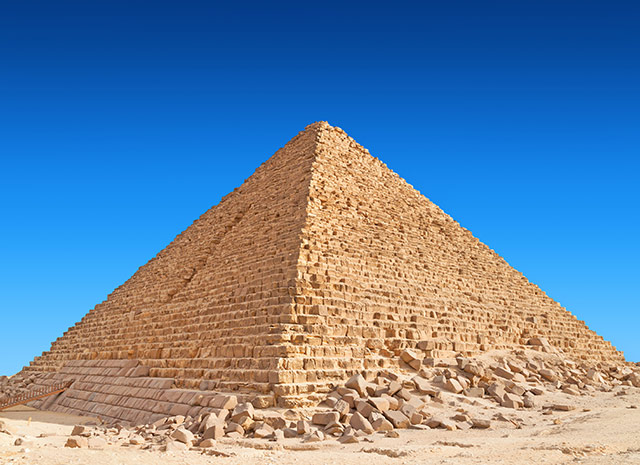30-foot-long secret corridor discovered in Great Pyramid of Giza
03/09/2023 / By Kevin Hughes

A 30-foot-long secret corridor has been found close to the main entrance of the Great Pyramid of Giza, Egyptian officials announced on March 2.
This discovery within the 4,500-year-old pyramid – the only one still standing among the Seven Wonders of the Ancient World – could lead to additional discoveries. An article by Nature issued on the same day as the announcement also mentioned that the corridor answers questions about the purpose of a gabled limestone structure in front of it.
Scientists from the ScanPyramids Project first stumbled upon the finding on Feb. 24 by using cosmic-ray muon radiography. They then fed an endoscope from Japan through a small joint in the pyramid’s stones, taking pictures of the corridor. ScanPyramids has been utilizing non-invasive technology as well as infrared thermography, 3D simulations and cosmic-ray imaging to look inside the structure since 2015.
Mostafa Waziri, secretary general of Egypt’s Supreme Council of Antiquities (SCA), said the corridor was probably made to redistribute the pyramid’s weight around either the main entrance used by modern-day tourists or another undiscovered chamber.
Five rooms atop the burial chamber of the Pharaoh Khufu in another part of the pyramid are also believed to have been built to redistribute the weight of the enormous structure. Waziri remarked the pharaoh likely had more than one burial chamber.
“We’re going to continue our scanning so we will see what we can do … to figure out what we can find out beneath it, or just by the end of this corridor,” the SCA head told reporters during a media conference in front of the pyramid.
Bigger corridor also discovered inside the Great Pyramid
The Great Pyramid was built as a tomb for Khufu (also called Cheops) about 2560 B.C. on the Giza plateau. Originally standing at 479 feet, the removal of much of its limestone casing reduced its height to 456 feet. (Related: Ancient people used shockingly advanced mathematics to erect monuments based on sacred geometry.)
During the same March 2 press conference, camera footage from the endoscope was released to members of the media. It displayed an empty corridor with walls created out of crudely carved stone blocks and a domed stone ceiling.
Archaeologist Zahi Hawass remarked that the corridor depicted a “major discovery” that would “enter houses and homes of people all over the world for the first time.” He added that it might help disclose whether the burial chamber of Khufu still survived inside the pyramid after thousands of years.
“In a few months from now we can see if what I’m saying is correct or not,” said Hawass, who served as antiquities minister for three months back in 2011. He contemplated that there might be “something important” in the space below the corridor.
The 30-fo0t-long corridor is not the only void found inside the Great Pyramid. Back in 2017, ScanPyramids found a larger void measuring at least 98 feet long. This void, which was discovered using muography, is situated directly above the pyramid’s Grand Gallery.
Just like the recently discovered corridor, researchers inserted an endoscope into the 98-foot-long void on Feb. 24 to discover its secrets. The team has not found any artifacts inside the longer corridor as of writing, however.
Visit Ancients.news for more stories about Ancient Egypt.
Watch the video below that explains the true purpose of the pyramids of Giza.
This video is from the Beyondtheicea channel on Brighteon.com.
More related stories:
Archaeologists discover RARE and possibly the OLDEST gold-covered Egyptian mummy.
Archaeologists uncover remains of mysterious Mayan queen in underground pyramid in Guatemala.
Ancient Egyptian tomb reveals GRUESOME murals of cows being slaughtered.
Secret tunnel system discovered beneath Pyramid of the Moon in Mexico.
Sources include:
Submit a correction >>
Tagged Under:
Ancient Egypt, ancient history, breakthrough, corridor, discoveries, Egypt, Giza, Great Pyramid, hidden chambers, Hidden History, Mostafa Waziri, real history, real investigations, research, ScanPyramids, Supreme Council of Antiquities, Zahi Hawass
This article may contain statements that reflect the opinion of the author



















